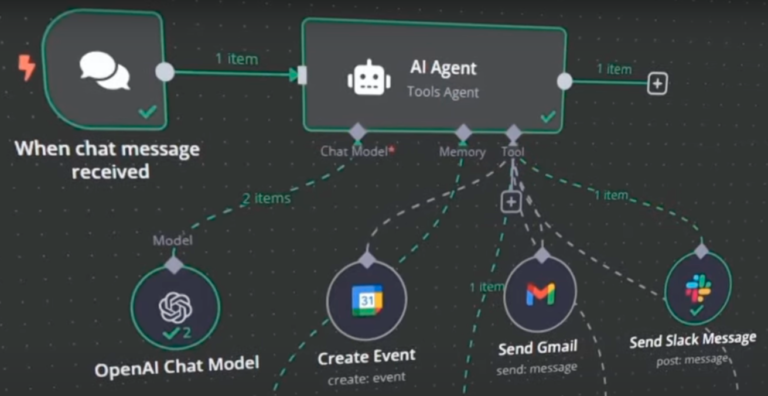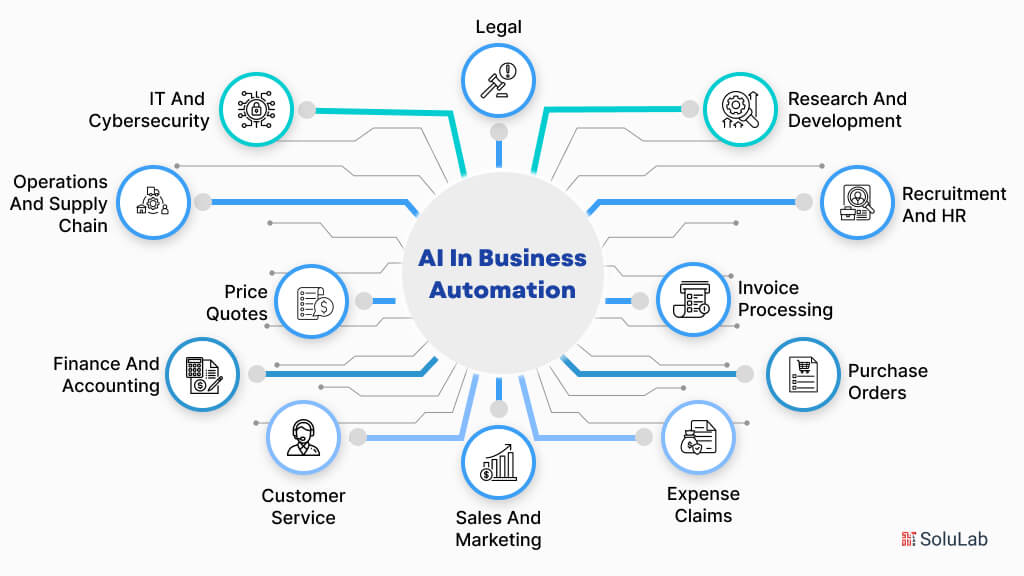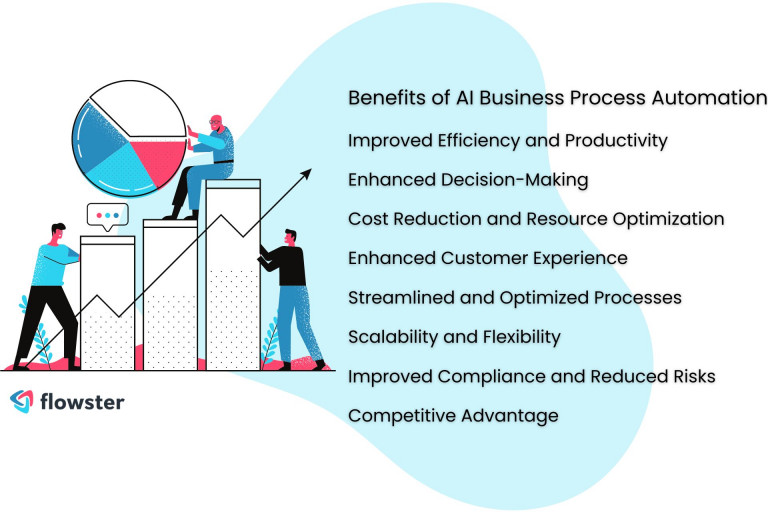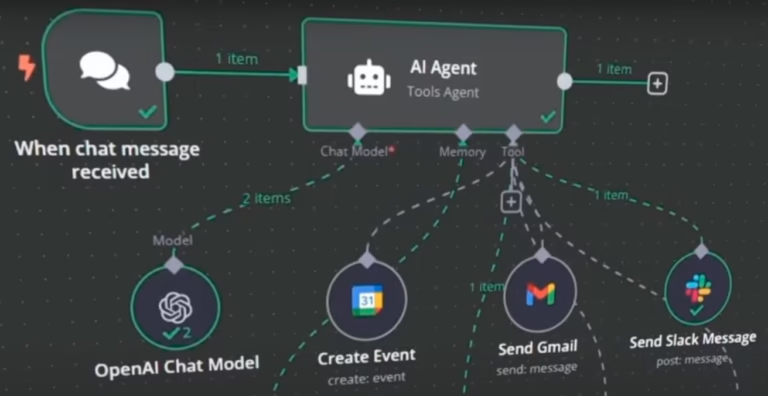Unlocking Business Potential: The Power of AI Workflow Automation for Businesses

Estimated reading time: 8-10 minutes
Key Takeaways
- AI workflow automation is essential for modern businesses to dramatically increase efficiency and reduce costs.
- It surpasses traditional automation by offering intelligence, learning, and adaptability for complex, unstructured data.
- Key benefits include enhanced productivity, significant cost reduction, fewer human errors, improved decision-making, and increased scalability.
- AI streamlines operations across departments like finance, HR, customer service, and sales by automating various tasks.
- Custom AI solutions provide a strategic advantage, precisely tailored to unique business needs and existing infrastructure.
- Advanced form integration using AI significantly reduces manual data entry errors and accelerates critical processes.
- Successful implementation demands data readiness, internal expertise, stakeholder buy-in, and a phased, iterative approach.
Table of contents
- Unlocking Business Potential: The Power of AI Workflow Automation for Businesses
- Key Takeaways
- Introduction: Unlocking Business Potential with AI Workflow Automation
- What is AI Workflow Automation?
- The Tangible Benefits of Workflow Automation in Business
- How AI Helps Streamline Operations with AI Automation
- The Strategic Edge of Custom AI Solutions for Business Efficiency
- Practical Application: Advanced Form Integration for Efficient Workflows
- Implementing AI Workflow Automation in Your Business
- Conclusion: The Future is Automated with AI
- Frequently Asked Questions
Introduction: Unlocking Business Potential with AI Workflow Automation
Modern businesses face intense pressure for efficiency, productivity, and customer satisfaction amidst fierce competition and rising operational costs. The demand for agility and innovation has never been greater.
It is in this demanding environment that AI workflow automation for businesses emerges as a truly transformative strategy. This is not merely a technological trend; it’s an operational necessity for long-term success, empowering companies to navigate complexities and thrive.
This blog post will define AI workflow automation, explore its compelling benefits, and provide practical examples of how it helps streamline operations with AI automation. We’ll also unpack the strategic advantages of custom AI solutions for business efficiency, and take a deep dive into advanced form integration for efficient workflows. Our thesis is clear: AI workflow automation is fundamental for modern businesses looking to dramatically increase efficiency, reduce costs, achieve higher productivity, and gain a sustainable competitive advantage. Indeed, AI workflow automation enables businesses to dramatically increase efficiency, reduce costs, and achieve higher productivity by automating and optimizing processes with intelligent, adaptable technology (Source: https://www.digitalfirst.ai/blog/ai-workflow-automation, https://pulpstream.com/resources/blog/ai-workflow-automation, https://www.airtable.com/articles/ai/workflow-automation, https://botpress.com/blog/ai-workflow-automation, https://www.moveworks.com/us/en/resources/blog/what-is-ai-workflow-automation-impacts-business-processes).

What is AI Workflow Automation?
AI workflow automation applies artificial intelligence technologies—such as Machine Learning (ML), Natural Language Processing (NLP), and computer vision—to automate, optimize, and intelligently manage business processes. It goes beyond simple task automation by enabling systems to *learn, adapt, and make decisions*.

Understanding the distinction from traditional automation, like rule-based Robotic Process Automation (RPA), is key:
- Traditional Automation: Follows fixed, predefined rules, best for highly repetitive, predictable tasks that don’t change. It functions as “if X, then Y.”
- AI Automation: Brings intelligence, learning, and adaptability (Source: https://botpress.com/blog/ai-workflow-automation). This means AI systems can:
- Process unstructured data (e.g., text, images, scanned documents).
- Learn from patterns to improve performance without explicit programming.
- Handle exceptions, variations, and complex scenarios.
- Perform tasks requiring interpretation, understanding, and predictive capabilities (e.g., sentiment analysis, fraud detection).
AI can automate workflows such as complex data extraction, intelligent document processing, and dynamic ticket routing, adapting to real-world variability and continuously optimizing processes (Source: https://www.digitalfirst.ai/blog/ai-workflow-automation, https://botpress.com/blog/ai-workflow-automation). This capability helps businesses effectively streamline operations with AI automation.
The Tangible Benefits of Workflow Automation in Business
Integrating AI into workflow automation delivers numerous quantifiable and qualitative benefits of workflow automation in business, actively helping to streamline operations with AI automation.

- Increased Efficiency & Productivity: AI automates high-volume, manual tasks (e.g., data entry, routine customer inquiries). This frees human employees from mundane work, allowing them to focus on higher-value activities requiring creativity and strategic thinking. Repetitive tasks are eliminated, enabling employees to prioritize innovation and customer relationships (Source: https://www.digitalfirst.ai/blog/ai-workflow-automation, https://pulpstream.com/resources/blog/ai-workflow-automation, https://www.airtable.com/articles/ai/workflow-automation, https://botpress.com/blog/ai-workflow-automation).
- Cost Reduction: By automating operational processes, businesses significantly reduce expenses related to manual labor, overtime, and human errors. AI systems perform tasks faster and more accurately, minimizing resource waste and operational overhead (Source: https://www.digitalfirst.ai/blog/ai-workflow-automation, https://pulpstream.com/resources/blog/ai-workflow-automation).
- Reduced Human Error: Automated systems, guided by AI, consistently follow protocols, drastically reducing data entry mistakes and inconsistencies common in manual operations. This leads to higher data quality and reliable process execution. Automated systems follow protocols consistently, significantly reducing data entry mistakes and process variability (Source: https://www.digitalfirst.ai/blog/ai-workflow-automation, https://pulpstream.com/resources/blog/ai-workflow-automation, https://www.airtable.com/articles/ai/workflow-automation).
- Enhanced Decision-Making: AI processes and analyzes vast data quantities at speeds impossible for humans. This provides businesses with accurate, real-time data and actionable insights, empowering leaders to make more informed, data-driven decisions swiftly and improve overall business performance (Source: https://www.digitalfirst.ai/blog/ai-workflow-automation).
- Improved Scalability: AI workflow automation allows businesses to efficiently handle fluctuating workloads, sudden spikes in demand, or rapid growth without proportional increases in human headcount. AI systems scale up or down as required, ensuring business continuity and agility (Source: https://pulpstream.com/resources/blog/ai-workflow-automation, https://www.airtable.com/articles/ai/workflow-automation).
- Better Resource Allocation: By offloading routine tasks to AI, both human and technological resources are optimized. Human teams can be reallocated to strategic initiatives demanding human skills, while technological assets are utilized for high-impact, AI-driven processes, ensuring maximum ROI. Human and technological resources are optimized, ensuring teams work on strategic tasks with maximum impact (Source: https://www.digitalfirst.ai/blog/ai-workflow-automation).
How AI Helps Streamline Operations with AI Automation
This section provides concrete examples demonstrating exactly how AI helps streamline operations with AI automation across various departments by tackling common bottlenecks like manual data transfers, lengthy approval cycles, and inconsistent customer interactions.

Department-Specific Examples of AI Automation:
- Finance: AI automates invoice processing (e.g., data extraction, validation), expense reporting, fraud detection, and compliance checks (Source: https://botpress.com/blog/ai-workflow-automation), leading to faster financial closes.
- Human Resources (HR): AI streamlines employee onboarding (e.g., document collection, system access) and provides intelligent support for inquiries through HR chatbots.
- Customer Service: AI-powered chatbots handle routine inquiries 24/7, provide instant support, dynamically route complex issues, and personalize interactions (Source: https://pulpstream.com/resources/blog/ai-workflow-automation). Learn more about the future of AI chatbots in customer service.
- Marketing & Sales: AI automates lead scoring, personalizes email campaigns, generates performance reports, and assists with predictive analytics for sales forecasting.
- Supply Chain & Logistics: AI optimizes inventory management by predicting demand, automates order processing, and streamlines logistics routing, reducing costs and speeding delivery.
Effective AI automation begins with **process mapping** (Source: https://www.airtable.com/articles/ai/workflow-automation, https://botpress.com/blog/ai-workflow-automation). This systematic analysis of existing workflows identifies:
- High-volume, repetitive tasks.
- Specific bottlenecks, delays, and human error points.
- Opportunities where AI’s intelligence and adaptability can add the most value and significantly streamline operations.
The Strategic Edge of Custom AI Solutions for Business Efficiency
Generic, off-the-shelf automation software often falls short for businesses with complex, unique, or highly specialized challenges. These solutions may lack the flexibility to integrate seamlessly with existing legacy systems, proprietary data, or industry-specific nuances.

This is where custom AI solutions for business efficiency provide distinct advantages:
- Tailored Precision: Custom AI solutions are built to address unique industry requirements, fit existing IT infrastructure, and leverage a company’s distinct datasets, perfectly aligning with specific operational needs.
- Maximized Impact & ROI: By precisely targeting pain points, custom AI delivers greater efficiency gains, cost savings, and competitive advantages than generic alternatives. They are designed to fit seamlessly into business-specific workflows, leading to maximum impact and a higher return on investment.
- Competitive Differentiation: A bespoke AI system offers capabilities competitors relying on standard software cannot easily replicate. This creates a unique strategic edge, allowing businesses to innovate faster, optimize unique processes, and differentiate their services, driving real and differentiated results (Source: https://botpress.com/blog/ai-workflow-automation).
- Scalability and Future-Proofing: Custom solutions are often designed with future growth in mind, making them more adaptable and easier to scale or modify as the business landscape changes.
Practical Application: Advanced Form Integration for Efficient Workflows
Manual data entry from diverse forms (e.g., invoices, onboarding documents) remains a major bottleneck. It’s time-consuming, error-prone, and leads to fragmented information, hindering efficient workflows.

The solution is AI-powered advanced form integration. AI capabilities (Intelligent Character Recognition, Natural Language Processing, Machine Learning) automate this process:
- Intelligent Data Extraction: AI accurately extracts relevant data fields from various form types, including digital, scanned, and even complex handwritten forms, adapting to varying layouts.
- Automated Validation: Extracted data is automatically validated against predefined rules, external databases, or cross-referenced with other documents to ensure accuracy.
- Contextual Understanding: AI goes beyond simple OCR, understanding the context and meaning of data within the document, which reduces errors and improves classification.
- Seamless Routing: Once extracted and validated, data is automatically routed and integrated directly into relevant business systems (e.g., CRM, ERP) without manual intervention.
Key benefits for efficient workflows include:
- Dramatic Reduction in Errors: AI minimizes data entry mistakes, leading to higher data quality.
- Expedited Processing: Automates tasks that would take hours or days manually, speeding up processes like invoice processing or client onboarding.
- Elimination of Redundant Tasks: Removes the need for manual data re-entry, freeing employees for strategic work.
- Enhanced Data Accessibility: Ensures critical information is consistently and immediately available, supporting better decisions and improved compliance (Source: https://botpress.com/blog/ai-workflow-automation).
- Improved Auditability: Creates clear, digital trails for data processing, enhancing compliance and audit readiness.
Implementing AI Workflow Automation in Your Business
Implementing AI workflow automation for businesses requires thoughtful planning and execution. Here’s practical advice:

Key Considerations Before Adoption:
- Data Readiness: Crucial for AI models; ensure clean, organized, accessible, high-quality data. Implement robust data governance.
- Internal Expertise & Talent: Assess capabilities; invest in staff training, hire new talent, or partner with external specialists.
- Stakeholder Buy-in and Change Management: Secure leadership support and effectively communicate benefits to employees. Position AI as augmentation, not replacement.
A Phased Approach to Implementation:
- Assessment & Discovery: Begin with comprehensive workflow assessment (process mapping) to identify suitable processes, prioritizing based on impact and feasibility.
- Pilot Projects: Start with small, well-defined pilots to test technology, gather lessons, demonstrate early successes, and build confidence.
- Scalability & Expansion: Once pilots prove successful, gradually scale automations across departments and processes, iteratively expanding AI integration.
Continuous monitoring and optimization are vital. AI systems require ongoing performance monitoring, new data collection, and regular recalibration to ensure effectiveness, adapt to changing needs, and learn from new patterns (Source: https://www.digitalfirst.ai/blog/ai-workflow-automation). Implement feedback loops and iterative improvements based on performance analytics.
Conclusion: The Future is Automated with AI
As explored, AI workflow automation for businesses is no longer merely a competitive advantage; it’s a fundamental pillar for survival and thriving in the dynamic modern marketplace. It delivers enhanced efficiency, cost reductions, minimized errors, accelerated decision-making, and unparalleled scalability.

Embracing AI unlocks new capabilities, fuels innovation, and allows businesses to adapt rapidly to market changes and seize new opportunities (Source: https://www.digitalfirst.ai/blog/ai-workflow-automation, https://botpress.com/blog/ai-workflow-automation). By proactively implementing AI workflow automation, businesses position themselves for stronger growth, greater resilience, and sustainable success in the automated future.
Frequently Asked Questions
- Q: What is the core difference between traditional automation and AI workflow automation?
A: Traditional automation follows fixed rules for predictable tasks. AI workflow automation uses AI (ML, NLP) to *learn, adapt, and make intelligent decisions*, handling unstructured data, exceptions, and complex, variable scenarios.
- Q: What are the main benefits businesses can expect from implementing AI workflow automation?
A: Businesses can expect increased efficiency, significant cost reduction, fewer human errors, enhanced data-driven decision-making, improved scalability, and optimized resource allocation, freeing human talent for strategic work.
- Q: Why are custom AI solutions often more beneficial than off-the-shelf software?
A:: Custom AI solutions are built to precisely address unique industry requirements and integrate seamlessly with existing infrastructure and proprietary data. This tailored approach maximizes impact, delivers greater ROI, and provides unique competitive differentiation and superior future-proofing.
- Q: How does AI-powered advanced form integration specifically help businesses?
A: Advanced form integration uses AI to intelligently extract, validate, and seamlessly route data from various forms into business systems. This dramatically reduces manual data entry errors, expedites processing, eliminates redundant tasks, enhances data accessibility, and improves auditability.
- Q: What are the crucial first steps for a business looking to implement AI workflow automation?
A: First steps include ensuring data readiness, assessing internal expertise, and securing strong stakeholder buy-in with effective change management. Begin with a comprehensive workflow assessment and launch small pilot projects before scaling.





